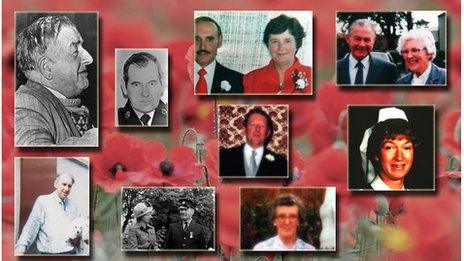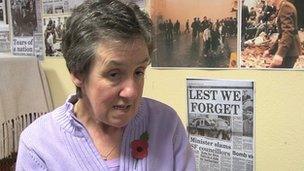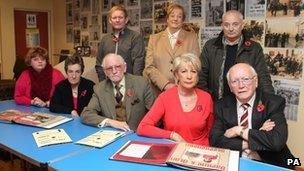Enniskillen survivors reflect on the bombing 25 years on
- Published

Eleven people were killed and more than 60 injured when an IRA bomb exploded in a hall close to the town's cenotaph on 8 November 1987. A 12th person died after 13 years in a coma.
Some of those affected by the IRA bombing of a Remembrance Day service in Enniskillen, County Fermanagh, 25 years ago, recall the impact of the atrocity.
Daphne Stephenson - Survivor
My memories of that day are of walking up to the cenotaph and other years I never stood on that side of the street but for some reason that year just decided with my husband to walk over to the other side because we thought we would have a better view.
I didn't hear a bang whatever way it happened. The force of the explosion lifted me off my feet. The building, the rubble fell on top of me, and I was buried.
I just thank the Lord for sparing my life that day.
I could hear someone shouting "there's someone here, there's someone here" and the next thing they were taking the rubble off me.

Daphne Stephenson was injured in the bombing, she believes many questions remain unanswered
We were approximately eight feet from the Reading Room wall.
Twenty-five years hasn't faded the memories I can still at certain times actually feel the rubble falling on top of me.
It's all there imprinted on my mind forever.
People would say to you "move on", well how do you move on? How do you ever forget being buried in rubble?
I feel that the victims are a forgotten people. This peace process... it's peace at any price, just push it all to the background.
I feel that I'm even more determined to speak out and the world needs to know what happened in Enniskillen, what was done to us while we were remembering the dead and we were there and were blew up and it's something that should never be wiped away.
There was millions spent on a Bloody Sunday Inquiry. It seems that there's justice for some parts of the community and not for others.
Why isn't there an inquiry for us? We need to know why the police didn't search the Reading Rooms.
We need to know what Martin McGuinness knows about this, he needs to come clean and tell us.
Aileen Quinton - whose mother Alberta was killed
I was living in London at the time and I saw the newsflash on television and I think it said something about seven deaths.
I knew absolutely that my mother would be there because she's ex-RAF and there's nowhere else she would be on Remembrance Sunday.
She was a nurse so the most obvious thing she would be doing would be helping the injured so I was more or less waiting just to confirm that she was ok and she was fine.
I rang my uncle in Belfast because it was impossible to get through to Enniskillen and he just broke down and said "Aileen, I'm sorry".
You know when somebody says that that it's not even injury because you don't say that. It was over, there was no hope.
It was just very surreal, I remember just trying to find out things and being hungry for the whys and wheres and who spoke to her last and what did she say.
I also wanted to know had she suffered and it took 17 years to actually get it properly confirmed that she hadn't.
In one way it does seem a lifetime and 25 years there are adults that it is their lifetime.
Just being here I've met people that I never met before that have got some different story about things that relate to my mother on that day that I'd never heard before and then it triggers some other memory that maybe you hadn't thought of in years and years.

Survivors and relatives of those who were killed in the 1987 Remembrance Day bombing in Enniskillen
Although in some ways it's quite hard it's actually also quite therapeutic and cathartic and it's one of the main reasons I've come home, more so in many ways than the actual act of remembrance although that's also very important.
I want justice. I think that justice is very important. I always consider that justice is a fundamental building block of a decent society.
There is some notion that it shouldn't matter any more, that after 25 years it's somehow less evil now but it's not, it is just as evil.
It's more evil than most people realise because they've completely forgotten about Tullyhommon.
(The IRA also targeted the village of Tullyhommon, 20 miles from Enniskillen, where members of the Boys' and Girls' Brigades were holding a Remembrance Day parade. The bomb was four times the size of the Enniskillen device but it failed to detonate.)
The bomb in Enniskillen was a smaller bomb. If the bomb had gone off in Tullyhommon we'd have had the mass slaughter of children.
Enniskillen would have been a footnote. This would be the 25th anniversary of the slaughter of children at Tullyhommon and that matters, it matters now, that people set out to do that.
Tommy Hallawell - rescuer
We lifted this big slab up and lo and behold there was young (Stephen) Ross. He was curled up in a wee ball and we got him away to the ambulance.
There were a lot of heroes that day, everybody was doing their best.
Those were all good people that perished away - we did our best.
I'm not a bitter person. I believe what you were born you can't help and it's the way you conduct yourself throughout life, that's what counts.
It's hard to believe that somebody would plant a bomb, for what, and kill those people?
I feel no bitterness for I feel bitterness breeds hatred and I'm not a person like that.
Sam Foster Ulster Unionist politician
Sad memories, memories of panic, memories of people who didn't know what to do.
I can remember well the roll of the bomb as it were, then there was the bang.
From that there was a strange silence which then developed into a mass of screeching, screaming, debris falling all over the place, glass breaking.
That someone should come along and deliberately do what they did, they are the scum of the earth and I reckon there's people in Enniskillen who have been in association with that if not actually laying it.
This was deliberate murder.
I think that it is hard that anybody, young people, who should still be alive enjoying what you can of life are no more and you've got to remember them like this, it's very, very sad.
It's a real shame that some people get so much freedom, going through the law, get out sometimes when they do things like this, that's what annoys us too.